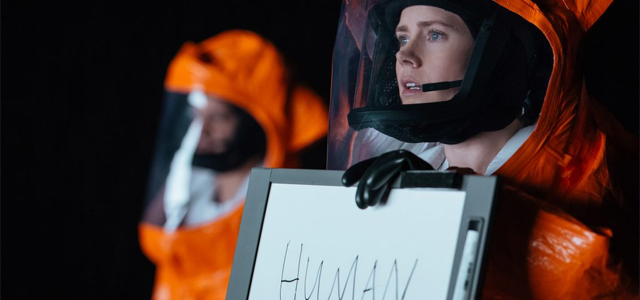Review: Arrival
(M) Amy Adams, Jeremy Renner, Forest Whitaker
Louise Banks (Amy Adams) is a linguist who seems to be living two different lives. She is a leading voice within her field yet she also is suffering through the trauma of loss within her family. Then the landing occurs: Aliens come to earth in 12 locations around the globe. Within days, Louise is abruptly sought after to assist with communicating with this alien race. With the assistance of the armed forces – and fellow scientist Ian Donnelly Jeremy Renner -she is in a race against time to communicate with this new species. Their work has implications that will impact world peace, the sustaining of life on earth and, ultimately, it will also affect her own personal life.
Arrival is an unexpected journey into the human experience, our shared identity as humanity and the things which cause the most connection and division within our species. This is a massive statement to make about an apparent alien invasion film, but the invasion from outer space is merely the vehicle to deliver much deeper considerations. Director Denis Villeneuve (Prisoners) provides a unique view of humanity and how it responds to things that cannot be defined by our current paradigms. There are many twists and turns on this psychological and philosophical journey, and Villeneuve portrays the ramifications of these events – and how they change the players, internally and existentially. This is an odyssey that will have a long-lasting and profound effect on audiences through its multi-dimensional considerations of the human condition.
To Villeneuve’s credit, the element that makes his film travel so well between these multiple levels are his main players. Amy Adams sits beautifully amid this jumbled array of philosophy and interstellar communications. She continues to prove to be one of the leading actors in Hollywood; this is one of her best performances to date. Her ability to convey emotion and intellect within the same scene, without issue, makes Arrival’s web of thought accessible. Jeremy Renner provides the measured intensity, quiet confidence and comedic element that supports Adams in her performance. The development of their relationship remains believable, even as the story journeys outside the realm of reality. Forest Whitaker gives the film its steely military element, and he always makes you want more of his character in the end. This could be positive or negative for his fans, depending upon how whether you’re happy with how much screen-time he gets throughout Arrival.
Arrival is best described as genre bending. It is not an alien invasion film or psychological thriller as much as it is a philosophical journey that entertains. It is a great film, but it may take time to determine exactly why – and that will be different for each person watching the film. It is worth watching with a friend, as it will provide loads of discussion for days.
What are some of the bigger questions to consider from this film?
The topics that are open for discussion are boundless with Arrival, but the one that stands out is the discussion of language. At the heart of this film is the frustration and solution that language provides when it comes to bringing unity throughout humanity. It might be hard for some of us to imagine that the Bible could have an answer to the perplexing notion of languages, but it does. At the very beginning of the human experience, language is a key issue for unity and pride. At the Tower of Babel (Genesis 11:1-9), God’s solution to the problem of pride was to introduce many languages. So, is Arrival’s premise a true solution or merely a re-introduction to the problem?
Passages on the value of words and the use of the tongue:
Genesis 11:1-9, Proverbs 21:23, James 3:2-10
Russell Matthews works for City Bible Forum Sydney and is a film blogger













